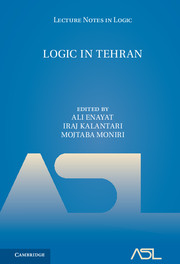Book contents
- Frontmatter
- Contents
- Preface
- Workshop and conference on logic, algebra, and arithmetic: Tehran, October 18–22, 2003
- Foreword
- Mathematical logic in Iran: A perspective
- Real closed fields and IP-sensitivity
- Categoricity and quantifier elimination for intuitionistic theories
- Primes and irreducibles in truncation integer parts of real closed fields
- On explicit definability in arithmetic
- From bounded arithmetic to second order arithmetic via automorphisms
- Local-global principles and approximation theorems
- Beatty sequences and the arithmetical hierarchy
- Specker's theorem, cluster points, and computable quantum functions
- Additive polynomials and their role in the model theory of valued fields
- Dense subfields of henselian fields, and integer parts
- A recursive nonstandard model for open induction with GCD property and cofinal primes
- Model theory of bounded arithmetic with applications to independence results
- Ibn-Sina's anticipation of the formulas of Buridan and Barcan
- Remarks on algebraic D-varieties and the model theory of differential fields
- A simple positive Robinson theory with LSTP ≠ STP
- Categories of theories and interpretations
- References
Additive polynomials and their role in the model theory of valued fields
Published online by Cambridge University Press: 30 March 2017
- Frontmatter
- Contents
- Preface
- Workshop and conference on logic, algebra, and arithmetic: Tehran, October 18–22, 2003
- Foreword
- Mathematical logic in Iran: A perspective
- Real closed fields and IP-sensitivity
- Categoricity and quantifier elimination for intuitionistic theories
- Primes and irreducibles in truncation integer parts of real closed fields
- On explicit definability in arithmetic
- From bounded arithmetic to second order arithmetic via automorphisms
- Local-global principles and approximation theorems
- Beatty sequences and the arithmetical hierarchy
- Specker's theorem, cluster points, and computable quantum functions
- Additive polynomials and their role in the model theory of valued fields
- Dense subfields of henselian fields, and integer parts
- A recursive nonstandard model for open induction with GCD property and cofinal primes
- Model theory of bounded arithmetic with applications to independence results
- Ibn-Sina's anticipation of the formulas of Buridan and Barcan
- Remarks on algebraic D-varieties and the model theory of differential fields
- A simple positive Robinson theory with LSTP ≠ STP
- Categories of theories and interpretations
- References
Summary
Abstract.We discuss the role of additive polynomials and p-polynomials in the theory of valued fields of positive characteristic and in their model theory. We outline the basic properties of rings of additive polynomials and discuss properties of valued fields of positive characteristic as modules over such rings. We prove the existence of Frobenius-closed bases of algebraic function fields F |K in one variable and deduce that F/K is a free module over the ring of additive polynomials with coefficients in K. Finally, we prove that every minimal purely wild extension of a henselian valued field is generated by a p-polynomial.
Introduction.This paper is to some extent a continuation of my introductive and programmatic paper [Ku3]. In that paper I pointed out that the ramification theoretical defect of finite extensions of valued fields is responsible for the problems we have when we deal with the model theory of valued fields, or try to prove local uniformization in positive characteristic.
In the present paper I will discuss the connection between the defect and additive polynomials. I will state and prove basic facts about additive polynomials and then treat several instances where they enter the theory of valued fields in an essential way that is particularly interesting for model theorists and algebraic geometers. I will show that non-commutative structures (skew polynomial rings) play an essential role in the structure theory of valued fields in positive characteristic. Further, I will state the main open questions. I will also include some exercises.
In the next section, I will give an introduction to additive polynomials and describe the reasons for their importance in the model theory of valued fields. For the convenience of the reader, I outline the characterizations of additive polynomials in Section 3 and the basic properties of rings of additive polynomials in Section 4. For more information on additive polynomials, the reader may consult [Go], cf. also [O1], [O2], [Wh1], [Wh2], [Ku4], [Dr–Ku]. The remaining sections of this paper will then be devoted to the proofs of some of the main theorems stated in Section 2.
- Type
- Chapter
- Information
- Logic in Tehran , pp. 160 - 203Publisher: Cambridge University PressPrint publication year: 2006
References
- 1
- Cited by



